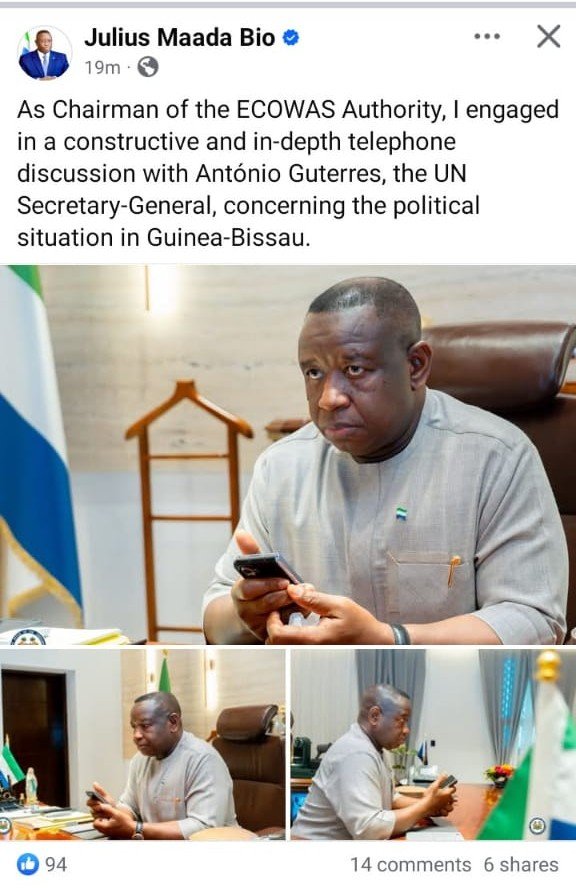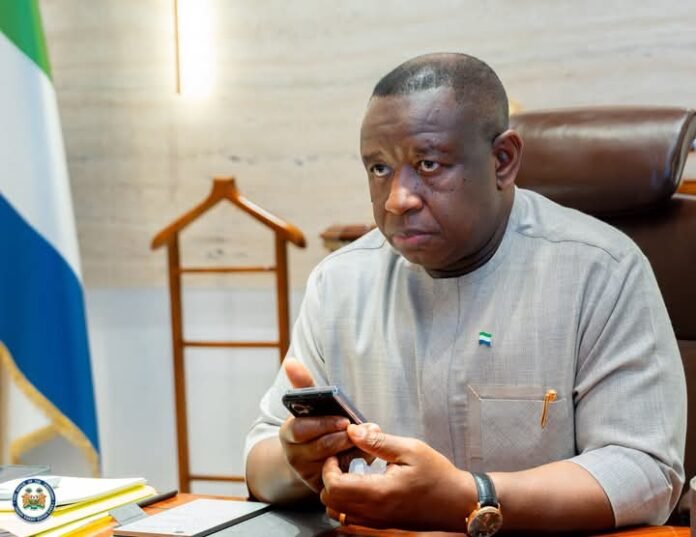Source: Africa Publicity
The Chairman of the Economic Community of West African States (ECOWAS) Julius Maada Bio, has had a telephone conversation with the Secretary-General of the United Nations (UN), António Guterres, concerning the coup d’etat in Guinea-Bissau.
Mr. Bio, who is the President of Sierra Leone, posted on his official Facebook page about the conversation he had with Mr. Guterres.
According to him, “As Chairman of the ECOWAS Authority, I engaged in a constructive and in-depth telephone discussion with António Guterres, the UN Secretary-General, concerning the political situation in Guinea-Bissau.”

President Bio did not any further details about the conversation.
The discussion between Mr. Bio and Mr. Guterres comes a day after Guinea-Bissau’s armed forces installed Major-General Horta Inta-a as transitional President on Thursday, November 27, 2025, after troops abruptly removed the country’s civilian leadership in a rapid takeover that unfolded before officials could release preliminary results from last weekend’s presidential election.
Guinea-Bissau’s coup marks the ninth coup or attempted coup in West and Central Africa in the past five years, intensifying concerns about regional instability. Guinea-Bissau, a small coastal nation long affected by political infighting and pervasive drug-trafficking networks, has experienced frequent military interference since independence in 1974.
Military Justifies Power Grab
The group calling itself the “High Military Command for the Restoration of Order” declared in a televised address Wednesday that President Umaro Sissoco Embaló had been deposed. The commanders accused unnamed politicians and narcotics traffickers of plotting to disrupt the state, though they provided no evidence or additional details.
Appearing on state television Thursday for the first time as interim leader, the uniformed Inta-a said the armed forces acted to prevent what he described as an attempt by “narcotraffickers to capture Guinean democracy.” He announced that the transition would last one year, beginning immediately.
Later that day, Inta-a appointed Major-General Tomas Djassi as the new army chief of staff, signaling a swift consolidation of control within the military hierarchy.
Coup Interrupts Tense Election Period
The takeover occurred just before provisional results were expected in the presidential contest between Embaló and his main challenger, 47-year-old political newcomer Fernando Dias, who had gained early momentum.
Gunfire erupted for nearly an hour on Wednesday near the National Electoral Commission and the presidential palace, heightening confusion in the capital, Bissau. Amid the unrest, Embaló contacted French media to say he had been ousted. Military officials later confirmed he and several senior government figures were being held “under the control” of the High Military Command.
Widespread International Condemnation
The African Union (AU) swiftly denounced the coup. AU Chairperson Mahmoud Ali Youssouf demanded the immediate release of Embaló and detained ministers. Regional bloc ECOWAS also condemned the military’s actions and convened an emergency virtual summit attended by leaders from Nigeria, Senegal, Liberia, and senior AU officials.
The European Union echoed the calls for restoring constitutional order and urged that the disrupted vote-counting process be allowed to continue.
Calm but Deep Uncertainty in Bissau
Though no casualties were reported, Bissau remained tense on Thursday. Soldiers were stationed throughout the city, many businesses stayed closed, and residents largely remained indoors despite the lifting of an overnight curfew.
“I’m very concerned about the situation,” said Julio Goncalves, a 30-year-old lecturer. “Pharmacies aren’t open. If someone needs medicine or urgent help, where can they go?”
Opposition Claims Election Interference
Before Inta-a’s appointment was confirmed, Dias accused Embaló of orchestrating a “false coup attempt” to invalidate the election due to fears of losing power. His political coalition demanded that authorities release the provisional election results and called for the release of former Prime Minister Domingos Simões Pereira, who was detained on Wednesday.
Security forces dispersed a small demonstration outside the building where Pereira was believed to be held, using tear gas.
Witnesses said live ammunition was also fired into the air to break up gatherings near Dias’s residence on the outskirts of Bissau.
Concerns About Drug Trafficking Persist
Guinea-Bissau is widely recognised as a major transit point for South American cocaine bound for Europe, and analysts say the entrenched influence of trafficking networks will remain regardless of the new military leadership.
“The major traffickers financed parts of the campaigns in these elections,” said Lucia Bird Ruiz-Benítez de Lugo, director of the Observatory of Illicit Economies in West Africa. “There is little reason to expect the drug trade’s political influence to diminish.”
Election Observers Missing
In a joint statement, AU and ECOWAS election observers demanded the immediate release of detained electoral officials. Concerns also mounted over the whereabouts of former Nigerian President Goodluck Jonathan, who had been in Bissau as part of the West African Elders Forum election mission. ECOWAS said it had been unable to reach him as of Thursday.
Nigeria’s foreign ministry warned that those responsible for any harm to election monitors “will be held accountable.”








